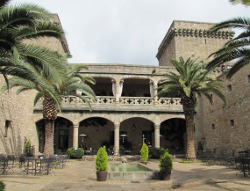Where to stay in Spain
Discover the real Spain
About-Spain.net
- a whole country to be discovered....
| Page Index: | Spanish
hotels |
Paradors |
Hostales |
| Chains and independents | Rural accommodation | Campsites |
Where
to stay in Spain - hotels, hostales, rural retreats and more
Find
hotels in Spain
Barcelona
Andalucia
Valencia area
Madrid area
Other areas of Spain
Click
for best online rates for hotels in the following areas :
Costa
Brava Barcelona
Andalucia
Valencia area
Madrid area
Other areas of Spain
About-Spain.net is
partnered with Europe's leading hotel booking portal, Booking.com, to
bring you the best online prices
Covid-19
info. Spain is welcoming
foreign tourists again but
the virus has not
gone away.
It could still come back. Spanish hotels have to observe social
distancing and hygiene rules, but there is no such
thing as
zero-risk. Rules may evolve with little prior warning.
The choice
Tourism is the leading sector of the Spanish economy, so not
surprisingly it is a sector that is well developed - not just to cater
for the planeloads of tourists from northern Europe who flock in every
day for a pre-booked package holiday on one of the Mediterranean costas.Many hotels on the Spanish coast are owned and run by or for large international package tour companies, and exclusively reserved for their own customers. But there is a lot more to the hotel sector in Spain than these international holiday palaces that line the water's edge; and for independent travellers driving through Spain, or even hiking, this is useful information.
Spanish hotels
 The
Spanish like their hotels and they like them comfortable and well
appointed. Spain seems to abound in four-star and five-star
hotels, and in many cases these can be booked at rates that are
considerably lower than similarly starred hotels in other countries.
Where else in western Europe could you get a room in a five-star hotel
for less than 100 € a night? While this is not the normal
going rate
for such luxury in Spain, there are cities and towns in Spain
- in mid 2012 - where it is still possible to book a room in
a five star hotel for less than this price, particularly out of season.
The
Spanish like their hotels and they like them comfortable and well
appointed. Spain seems to abound in four-star and five-star
hotels, and in many cases these can be booked at rates that are
considerably lower than similarly starred hotels in other countries.
Where else in western Europe could you get a room in a five-star hotel
for less than 100 € a night? While this is not the normal
going rate
for such luxury in Spain, there are cities and towns in Spain
- in mid 2012 - where it is still possible to book a room in
a five star hotel for less than this price, particularly out of season.The same goes for four-star hotels: with the exception of Barcelona, where hotel prices seem to be considerably higher than the rest of Spain, prices are generally far more affordable than in France or Germany, not to mention the UK. Indeed, right across the range, Spanish hotels usually offer good to excellent value for money compared to hotels in countries further to the north.
As a price guide, it should normally be possible to find a room for two in a three-star hotel in Spain for under 100 € a night - sometimes for less than half of that, and a room in a two-star hotel for less than 60 €, including breakfast.
Los Paradores Nacionales

Parador in a Renaissance castle
Though they are classed from three to five stars, these state-run hotels all offer a fabulous and unique environment, with all the luxury of a modern hotel mostly within walls that have stood for centuries, and in some cases are inseparable from the history of Spain. Paradors are not cheap, but for what they offer they are not expensive either. Generally expect to pay upwards of 120 € a night for a double room including breakfast - though some off-season special offers come in at below this. Paradors for which there is considerable demand, for instance the Parador set within the Alhambra at Granada, are considerably more expensive .... but still normally cheaper than equivalent accommodation in London, Paris, or even Barcelona.
Hostales
Hostales, pronounced host-tal-es, are not hostels, but small hotels that do not meet all the requirements to be classed as hotels. Most have less than ten rooms. Generally speaking, they correspond to small one or two star hotels - sometimes in the backpacker hotel style, but sometimes undistinguishable from small hotels that are classed as such. In most cases, hostales are run by live-in owners, who try to ensure a convivial and friendly atmosphere. If it's luxury you are after, don't choose a hostal; but if a homely atmosphere and bargain prices are among your selection criteria, then hostales could well be a good choice. A double room in a hostal is often available for under 30 € a night - depending of course on the location.Pensiones
Designated by the letter P - rather than an H - on a blue background, a pension is a kind of guest house, often no more than a room or two for hire above a caf� or a restaurant; pensiones can be found in towns and even in villages. En-suite bathrooms are unusual in pensiones, which offer accommodation at bargain-basement rates - as little as 15 € a night in 2012.
Posadas
The word "Posada" does not designate an official category of guest accommodation, but a type of accommodation, best thought of as the equivalent of an old English country inn. Thus posadas tend to be located in small towns or along old routes across Spain, and when the word is used in the name of a hotel or hostal, it usually indicates that the owners see their establishment as a modern version of the inns of yesteryear. In out of the way places, and off main roads, posadas thus tend to be places with some character : but when driving in Spain, it is not uncommon to see signs for a posada beside main roads; while some use the word in the traditional sense, others abuse it much in the way that "inn" is used in the brand names of a number modern international budget hotel chains.
Spanish hotels; chains and independents
Spain has a number of hotel chains, the biggest of them being NH Hoteles and Melia. With 160 hotels in Spain, NH is a chain that essentially targets the business market, with its smart contemporary hotels.Melia hotels, formerly Sol Melia, is one of the world's ten largest hotel companies; they have 181 hotels in Spain (as of 2012), including a large number of modern resort hotels; for example, there are no less than seven different Melia hotels among the hotels in Torremolinos, on the Costa des Sol. Melia also now own the Tryp chain specialising in modern upmarket hotels.
Other large players in the Spanish hotel market include Barcelo Hotels & Resorts, with mostly four-star hotels, and Sercotel, with 134 city hotels some of them modern, others housed in classic city-centre buildings. In addition, Spain is home to a number of smaller chains, such as Room Mate hotels - stylish contemporary city hotels, or the mid-range Catalonia Hoteles group. On a completely different level is the Rusticae group, a grouping of about 200 small cosy rural hotels throughout Spain - each one with its own individuality.
Do not expect to find in Spain, as you do in France, arrays of lookalike low-cost chain hotels on the outskirts of every town or city. There are some, but nothing like in the same proportion as in France. One low-cost Spanish hotel chain is Sidorme, with prices from about 35 € upwards... but they only have 7 hotels - considerably fewer than the growing number of Spanish Ibis and F1 hotels which belong to the French Accor group.
Most hotels in Spain, particularly smaller ones, are independent establishments; rooms in independent hotels, specially in the one-star to three-star bracket, are often very competitively priced; normally with bar and restaurant attached or close-by, these hotels are popular with travellers, offer a traditional Spanish experience, and perhaps help to explain why low-cost budget hotel chains have been slow to develop in this country.
Casas rurales
The term Casa rural, meaning country house, is used to describe a range of different types of rural accommodation in Spain, including the equivalent of French "gites" (which in Spain often offer flexible booking periods, not just weekly rentals), rural bed and breakfast accommodation, and rural hostales – in addition to rural hostels for groups and parties.Camping in Spain
See Camping in Spain for a guide to camping on the Spanish coasts and inland in Spain.Some
useful sources of accommodation information:
- Small hotels with character : Independent hotels in Spain.
- Gitelink Spain : Rural holiday cottages in Spain
- Alojamentos y casas rurales - if you speak Spanish
Some
useful sources of accommodation information:
- Small hotels with character : Independent hotels in Spain.
- Gitelink Spain : Rural holiday cottages in Spain
| ►► Spain - a thematic guide: |
| Spain - Essential information. |
| Driving
in Spain Getting around Spain by car - roads, rules and tips |
|
Route map of Spain Toll and free motorways, main routes |
| Low-cost car hire in Spain |
| Spain by train Rail travel and rail tourism in Spain |
| Tourism
in Spain
Where to go and what to see |
| The coasts of spain |
| Top attractions in Spain |
| Spain - Areas and regions |
| Andalucia |
| Eastern Andalucia |
| Western Andalucia |
| Asturias |
| Castile y Leon |
| Castile La Mancha |
| Extremadura |
| Valencia |
| Undiscovered Spain |
| Map of the Spanish regions |
| Life and living |
| Camping in Spain |
| Spanish food and eating |
About-Spain.net is an affiliate partner of Booking.com and Hotels.com, and as such may receive a small commission on transactions conducted on these websites. This is of no cost to the user.
Visit
our companion guides:
Text and photos copyright © About-Spain.net 2012-2025, except where otherwise indicated.
Photo top of page by Elliot Brown; licence Creative commons.


